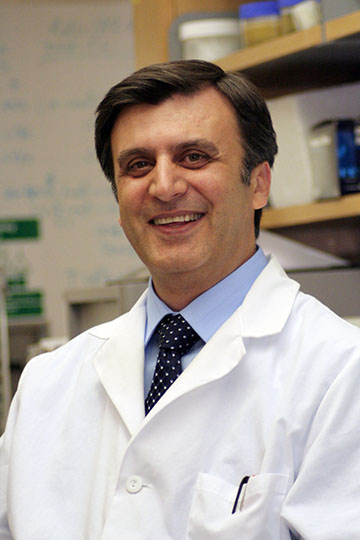Latest News
Research
Massey scientists discover new form of immune cell with implications for treating cancer
Nov 26, 2018

Scientists at VCU Massey Cancer Center have identified a unique type of immune cell that could potentially be used to inform the development of a novel cancer vaccine.
Research led by Masoud Manjili, D.V.M., Ph.D., and published in the Journal of Leukocyte Biology, discovered that a specific class of myeloid cells was associated with enhanced immune response and prolonged survival in a mouse model of metastatic breast cancer. Myeloid cells originate in the bone marrow and are responsible for the production of red blood cells, platelets and the majority of white blood cells.
The Massey scientists are hopeful that their findings may potentially guide the treatment of cancer and other diseases.
Antigen presenting cells (APCs) are a group of immune cells that are responsible for initiating an immune response to cancer. Dendritic cells are a type of APCs that help kick-start the immune response against infectious diseases and cancer. They possess several qualities that make them a prime candidate for the development of antitumor vaccines, such as the FDA-approved therapeutic vaccine for metastatic prostate cancer Sipuleucel-T.
However, white blood cells that are amplified by dendritic cells to fight cancer cells are often subsequently inhibited by a separate type of immune cells called myeloid-derived suppressor cells (MDSCs). MDSCs multiply in response to cancer and other infectious diseases, suppress the anti-tumor response of other cells and instigate cancer progression. Therefore, the effectiveness of DC-based cancer vaccines is sometimes limited because MDSCs counteract their ability to fight tumors.
“There is an urgent need to identify a new class of APCs that are highly efficient in orchestrating antitumor immunity and can function in the immune suppressive tumor microenvironment,” said Manjili, member of the Cancer Cell Signaling research program at Massey and professor of immunology at the VCU School of Medicine.
In recent years, there has been a rapid increase in the understanding of the biology of APCs, specifically their role in the activation of T-cells, which are white blood cells that fight infection and disease. Previous research indicated that the activation of certain T-cells was associated with the decreased activity of MDSCs in mice.
Manjili’s research team determined that an increased number of a unique type of APCs,Gr1-/lowCD11b-/low cells, correlated to prolonged survival in mouse models of metastatic breast cancer.
There are several characteristics that set Gr1-/lowCD11b-/low cells apart from dendritic cells. They are much more abundant in the blood; they are heterogenous, making them highly effective in both antigen uptake and antigen presentation against cancer; they are not suppressed in the presence of tumor cells; and their frequency inversely correlates with MDSCs.
“These properties make them a potential candidate for a novel cell-based cancer immunotherapy without having the limitations of current cell-based vaccines,” Manjili said. “Our findings provide evidence for the need to continue investigating Gr1-/lowCD11b-/low cells in further preclinical cancer vaccine studies.”
Additionally, Manjili and colleagues found that a type of APCs in humans, CD33+CD11b-/lowHLA-DR+ cells, appears to have a similar characteristic as Gr1-/lowCD11b-/low cells in mice. Using human blood cells from patients with early stage breast cancer, Manjili demonstrated that the conversion of MDSCs to CD33+CD11b-/lowHLA-DR+ cells led to an increased antitumor response.
Manjili collaborated on this research with Kyle Payne from the Moffitt Cancer Center; Michael Idowu, M.B.B.S., M.P.H., and Harry Bear, M.D., Ph.D., members of the Developmental Therapeutics research program at Massey; Xiang-Yang Wang, Ph.D., member of the Cancer Molecular Genetics research program at Massey; VCU School of Medicine graduate students Hussein Aqbi, Savannah Butler and Rebecca Keim; Laura Graham from the VCU Department of Surgery; and Wen Wan from the VCU Department of Biostatistics.
This research was supported by the Office of the Assistant Secretary of Defense for Health Affairs through the Breast Cancer Research Program under Award No. W81XWH-14-1-0087; the American Association of Immunologists’ Careers in Immunology Fellowship; pilot funding from VCU Massey Cancer Center; and, in part, with funding from Massey’s NIH/NCI Cancer Center Support Grant P30 CA016059.
The full manuscript of the study published in the Journal of Leukocyte Biology is available at: https://jlb.onlinelibrary.wiley.com/doi/pdf/10.1002/JLB.5A0717-276RR
Written by: Blake Belden
Related News
Research
“We’re aiming for a cure.” Massey and VIMM researchers achieve potential breakthrough in brain cancer treatmentJun 24, 2025
Research
Massey researchers discover new genetic target that could shape the future of liver cancer treatmentJun 23, 2025
Research
Virginia health leaders emphasize community impact, collaboration at Virginia Public Health Summit on CancerJun 10, 2025

Get access to new, innovative care
Treatments in clinical trials may be more effective or have fewer side effects than the treatments that are currently available. With more than 200 studies for multiple types of cancers and cancer prevention, Massey supports a wide array of clinical trials.

Find a provider
Massey supports hundreds of top cancer specialists serving the needs of our patients. Massey’s medical team provides a wealth of expertise in cancer diagnosis, treatment, prevention and symptom management.
